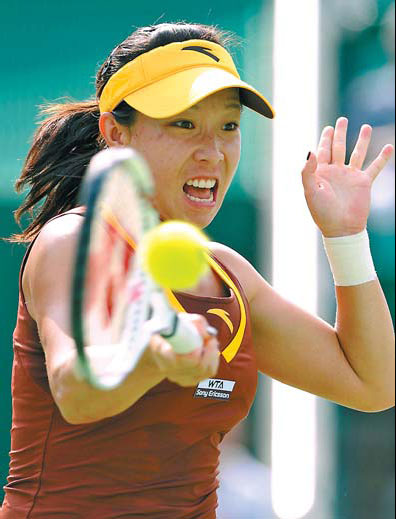Zheng gearing up for one more turn in spotlight
 0 Comment(s)
0 Comment(s) Print
Print E-mail
China Daily, November 1, 2011
E-mail
China Daily, November 1, 2011
 |
|
Zheng Jie of China plays a shot against Jarmila Gajdosova of Australia during their second-round match at the Japan Women's Open tennis tournament in Osaka, Japan on October 12. Zheng advanced to the semifinals at the event. Toru Yamanaka / Agence France-Presse. |
A lot of things are conspiring to keep Zheng Jie off the tennis court.
Two tough surgeries, a happy marriage, her 28th birthday - any one of those might be enough to convince another player it's time to put the racket away.
Yet there she stays.
China's first Grand Slam semifinalist still has her eye on the major tour.
"Definitely, it's not the time (for me to retire). I feel myself returning on the right track. Hopefully, I can play well at the following tournaments this year and get ready for the Australian Open as a seed," Zheng said during the 2011 Mercedes-Benz China Tennis Grand Prix in Nanjing over the weekend.
"I don't want to push myself too hard. If there is a (ranking) goal, I hope it's top 30 for next year," said the current world No 48.
Zheng withdrew from the Nanjing semifinals with a stomach ailment but has recovered in time to play her last tournament of the calendar year, the OEC Open in Chinese Taipei this week.
Li Na's milestone victory at the French Open aside, it was Zheng who proved the Chinese could compete on the Grand Slam stage when she advanced to the Wimbledon semifinals in 2008.
However, as Zheng joked on her micro-blog, she "always meets accidents on the road to success".
Zheng created a new chapter for Chinese tennis when she bagged back-to-back doubles title at the Australian Open and Wimbledon with Yan Zi in 2006.
An ankle injury cut her down in 2007, dragging her ranking out of the top 200.
Zheng fought back, meeting Li at the semifinals in Melbourne Park last year and improving her ranking to No 15. But a severe wrist injury ended her 2010 US Open, and sidelined her for six months.
Setbacks are tough, but the Sichuan native is resilient. Zheng bounced back this year in North America and reached the WTA semifinals at events in Guangzhou and Osaka recently.
"She's recovered very well from the wrist operation - maybe 85 percent of full strength now. We will work on her fitness and try to improve her mental toughness in winter training camp," said Zheng's husband and coach Zhang Yu.
Zheng is upbeat about next season.
"Actually, I think I am lucky. Everyone could be hurt badly, some never come back, but I still managed to return. Last time, I reached a career high after my injury. I expect it happen again next year," she said.
Zheng will team with world No 16 Peng Shuai to pursue the doubles gold medal at the London Olympics.
With a package of Zheng's mobility and net sense and Peng's solid baseline stroke, the pair is among the favorites for the gold.
Still, Zheng is trying to set her sights realistically.
"We haven't cooperated before. The lack of chemistry means we need more time playing together," she said. "But we often compete separately on the pro tours. It's hard to make a balance. We will try to adjust our schedule."
All the while, the younger generation is watching.
Twenty-one-year-old Han Xinyun, the Nanjing event's female champion, hailed Zheng as a "consistent role model".
"She remains competing at a high level, too strong for us to handle.
"If she had played the semis, I wouldn't have made in the finals. She's definitely set an example for the newcomers," said Han, who was Zheng's semifinal opponent before Zheng pulled out.
Zheng takes time to cultivate the nation's talent, holding her namesake youth clinic every summer since 2007.
"I know the feeling of confusion at the beginning - it's horrible," Zheng said. "So I don't want them to feel that again. Hopefully, my experience will make a difference."






Go to Forum >>0 Comment(s)